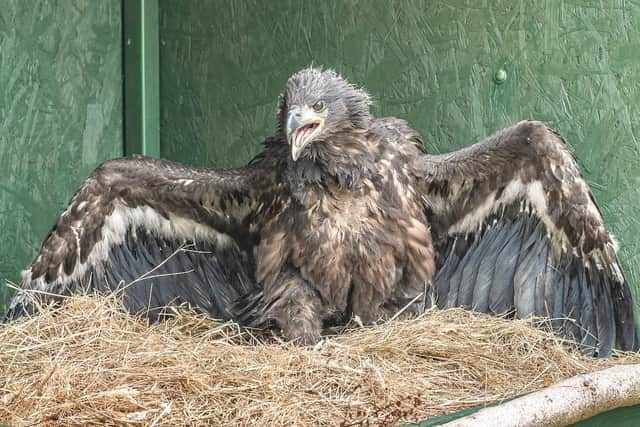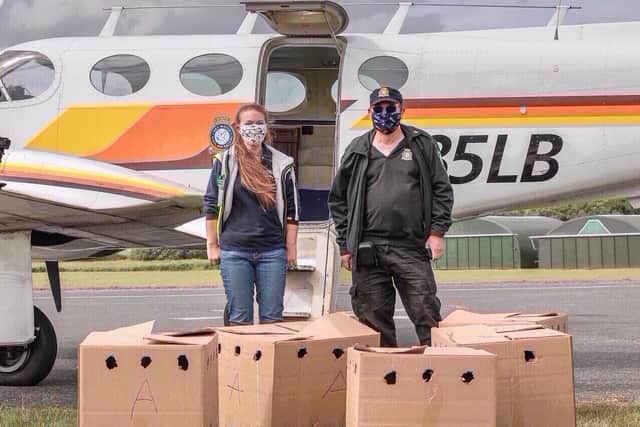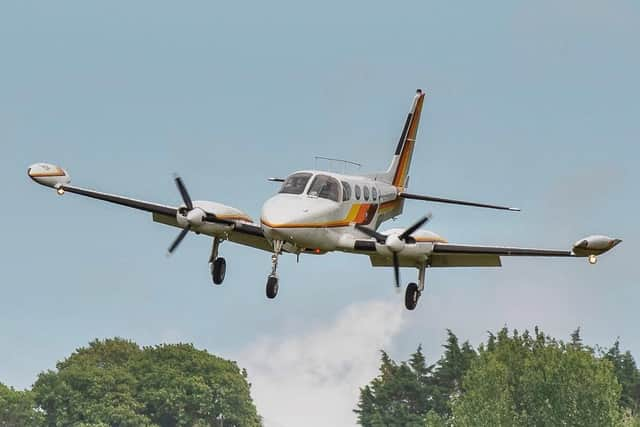Leighton Buzzard father and daughter team save eagle conservation project from major pandemic setback
and live on Freeview channel 276
The White-tailed Sea Eagle, also called the sea eagle, has a wingspan of some 8ft and is often referred to as the ‘flying barn door’!
The sea eagle was last seen in England, on the Isle of Wight, in 1780 and it became extinct in the UK, in Scotland in 1918. In 1975 a full-scale reintroduction, supported by the Nature Conservation Society, the Royal Society for the Protection of Birds, together with other conservation groups, saw the White-tail Sea Eagle once again flying in the skies over Scotland. This programme, supported by the Royal Air Force and the Royal Norwegian Air Force saw 82 chicks brought to Scotland from Bodo in Norway, close to the Arctic Circle.
Advertisement
Hide AdAdvertisement
Hide AdIn 2019, with the support of the Roy Denis Foundation, the reintroduction programme was extended to England with a 5-year plan.


Six young birds were released on the Isle of Wight with an intention to release a further seven in 2020. Then the pandemic struck the UK in March and the country was placed in lockdown.
Transporting young sea eagles from Scotland to the Isle of Wight by road was now impossible and the new conservation project was in danger of foundering just a year after it had begun.
Fortunately, the UK Civil Air Patrol chief pilot, Graham Mountford, together with his daughter Helen, from Leighton Buzzard, are both animal conservationists and are particularly well known for transporting seal pups on behalf of the British Divers Marine Life Rescue.
Advertisement
Hide AdAdvertisement
Hide AdSo, with road transport out of the question due to the coronavirus, it was agreed that seven sea eagle chicks should be transported by air from Inverness Airport in the Highlands of Scotland to the airfield at Bembridge on the Isle of Wight.


At Inverness the flight, reminiscent of the flights by the RAF and the RNoAF in the 1970s, was supported by Highland Aviation and at Bembridge the aircraft was met by Tim Mackerill of the Roy Denis Foundation and Stephen Egerten-Read of Forestry England.
The journey from Inverness to the Isle of Wight, which would have taken a minimum of 18 hours by road, with numerous welfare stops, took just 2 hours and 40 minutes in Graham Mountford’s Cessna 340 and, most importantly, the birds were totally unphased by their 500 mile flight!
With Graham and Helen being from the household, coupled with Helen's animal handling and zookeeping experience it was the perfect solution.
Advertisement
Hide AdAdvertisement
Hide AdGraham said: "It was a real privilege to be able to help with this. When I got the phone call asking if I could go up to Scotland to pick up some eagles there was no way I was going to say 'no'. Combining a passion for animals and flying into one trip was a no-brainer. They are incredible animals.


"When I fly the airplane I can't be thinking of what's happening in the back, that's why it was important Helen came along because she's confident with animals."
Helen added: "It feels so good to be helping, especially when something like this is happening where things are having to be cancelled and postponed. This is such an important and amazing project."
After the flight, Mr Mackerill said: ”Both the Roy Denis Foundation and Forestry England are immensely grateful to Graham and Helen Mountford and to the UK Civil Air Patrol. Without their timely intervention the project to re-introduce the magnificent White-tailed Sea Eagle into England would not have taken place this year and the whole conservation project would have suffered a significant set-back.”
Advertisement
Hide AdAdvertisement
Hide AdThe UK Civil Air Patrol chief executive for England and Wales, Jeff Smith, added: “This safeguarding air transport flight, together with our outstanding conservationists, father and daughter team, Helen and Graham Mountford, is a wonderful testament to the ethos of our charity and demonstrates the vast capability, together with the utility of our fleet of aircraft for air transport duties and air search missions. I love the irony that the first flight for these beautiful sea eagles was in an aircraft at 10,000 feet.”